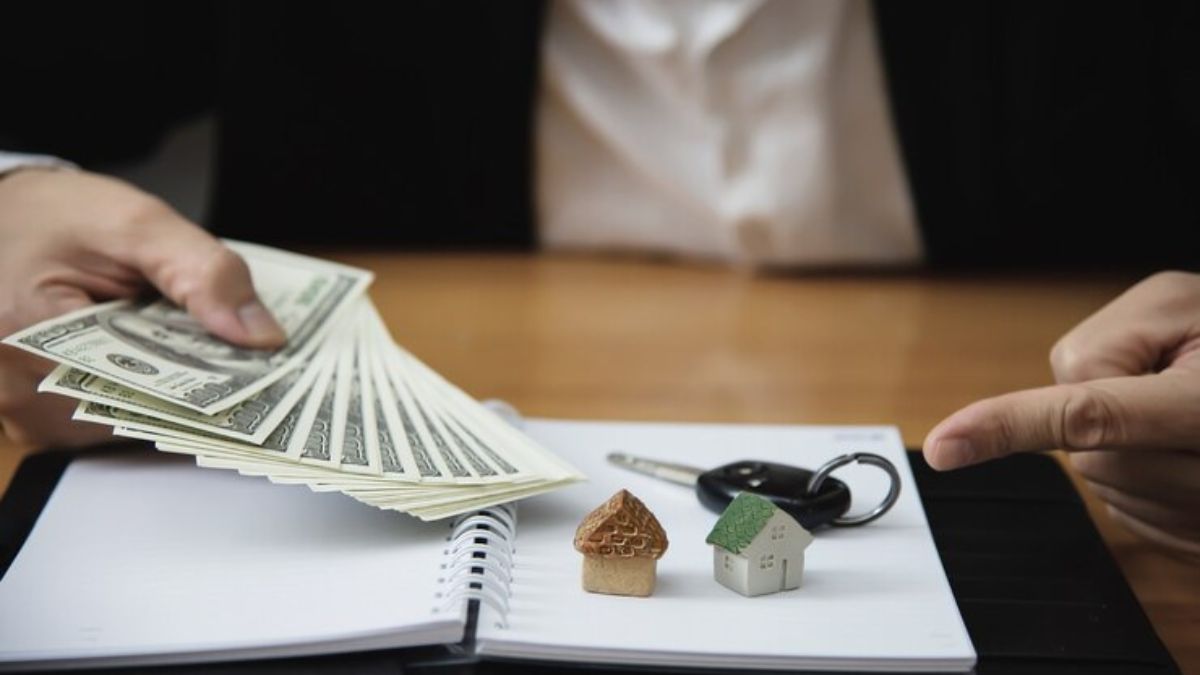REAL ESTATE
Unlocking the Power of Real Estate: How to Invest in Deeds for Steady Returns

Investing in real estate can take many forms, and one of the lesser-known yet highly lucrative options is to invest in deeds. Deed investing allows you to gain exposure to real estate markets without directly owning property. Instead, you hold the deed to a property, which can provide steady returns and unique opportunities for growth. This guide will walk you through the process of investing in deeds, its advantages, and strategies for success.
What Does It Mean to Invest in Deeds?
When you invest in deeds, you are purchasing legal ownership rights to a property. These deeds can be acquired through different avenues, such as tax lien sales, foreclosure auctions, or direct deals with property owners. In many cases, this type of investment allows you to secure properties at a discount, with the potential to either take full ownership or profit from selling the deed.
Deed investing offers both active and passive approaches, depending on your level of involvement and investment goals.
Why Invest in Deeds?
1. High Returns on Investment
One of the biggest draws for those looking to invest in deeds is the potential for high returns. Since many deeds are purchased at a fraction of the property’s market value—often through tax lien auctions or foreclosures—investors can see significant profits when selling or taking ownership of the property.
2. Lower Capital Requirement
Compared to traditional real estate investments, investing in deeds usually requires less upfront capital. This lower barrier to entry makes it accessible to a wider range of investors who want exposure to real estate without the need for full property ownership or large financial commitments.
3. Real Estate Exposure Without Direct Ownership
Investing in deeds allows you to benefit from real estate markets without the complexities of being a landlord or property owner. There’s no need to worry about maintenance, tenant issues, or property management. This makes it an attractive option for those seeking passive income or portfolio diversification.
Types of Deed Investments
1. Tax Lien Deeds
A tax lien deed is issued when a property owner fails to pay their property taxes. In this case, the local government places a lien on the property, and the lien is sold to investors at a tax lien auction. As an investor, you pay the delinquent taxes, and in return, you receive the right to collect interest or, in some cases, take ownership of the property if the taxes remain unpaid.
Tax lien deed investments offer lucrative interest rates, typically ranging from 8% to 36%, depending on the jurisdiction. This provides a steady return while holding the potential to take over the property.
2. Foreclosure Deeds
Foreclosure deeds are issued when a homeowner defaults on their mortgage, leading the lender to reclaim the property. These deeds are often sold at foreclosure auctions at a significant discount, offering the opportunity for investors to purchase property below market value.
Investing in foreclosure deeds can be risky, as properties may come with outstanding liens or require extensive repairs. However, the potential rewards can be substantial if the property can be resold or rented for profit.
3. Quitclaim Deeds
A quitclaim deed transfers ownership of a property from one party to another without providing a guarantee that the title is free of encumbrances. Investors may acquire quitclaim deeds through direct deals with property owners who are looking to offload their property quickly. While these deeds come with more risk, savvy investors can find opportunities by thoroughly researching the property’s title and condition.
Quitclaim deeds can be useful in situations where there are minimal liens or title disputes, making it easier to acquire the property at a lower price.
How to Invest in Deeds
1. Research Local Laws and Markets
When you’re ready to invest in deeds, the first step is to thoroughly research the local market and understand the laws governing deed sales. Every jurisdiction has different rules for tax lien and foreclosure sales, so it’s essential to be familiar with the process in your target area. Knowing the legal framework will help you avoid common pitfalls and take advantage of investment opportunities.
2. Attend Auctions
Many deed sales take place through public auctions, often organized by local governments or lending institutions. These auctions are a prime opportunity to purchase deeds at a discounted rate. Some auctions are held in person, while others take place online. Either way, it’s important to set a budget and conduct due diligence on the properties before bidding.
When attending auctions, focus on properties that offer the highest potential for return while staying within your financial comfort zone.
3. Conduct Due Diligence
Before purchasing any deed, it’s crucial to conduct a thorough investigation into the property’s condition, title, and any outstanding liens. This is especially important for quitclaim and foreclosure deeds, which may come with complications. By performing due diligence, you can avoid costly mistakes and make more informed investment decisions.
4. Plan for Exit Strategies
When you invest in deeds, having an exit strategy is key to maximizing returns. Some investors choose to hold the deed and collect interest or rent from the property, while others may sell the deed for a quick profit. Understanding your financial goals and time horizon will help you decide the best exit strategy for each investment.
Popular exit strategies include flipping the property, selling the deed at a markup, or holding onto the property for long-term appreciation.
Pros and Cons of Investing in Deeds
Pros:
- High potential returns: Properties acquired through deed investing are often purchased at a fraction of their market value.
- Lower upfront cost: Compared to traditional real estate, deed investments require less capital.
- Passive income potential: Collecting interest from tax lien deeds or rental income from acquired properties offers passive income opportunities.
- Diversification: Deeds provide an alternative investment path that complements a traditional portfolio.
Cons:
- Risk of liens or encumbrances: Some properties may come with legal complications or require extensive repairs.
- Market volatility: Real estate markets can fluctuate, affecting the value of the properties associated with the deeds.
- Due diligence required: Investors must perform careful research before purchasing a deed to avoid unwanted surprises.
- Competition at auctions: Other investors may bid up prices, reducing the potential for high returns.
Conclusion: Is Deed Investing Right for You?
To invest in deeds offers an exciting way to tap into real estate markets with minimal capital while enjoying potentially high returns. Whether you’re interested in tax lien deeds, foreclosure deeds, or quitclaim deeds, understanding the process and performing thorough research is essential for success. For those seeking passive income, diversification, or real estate exposure without direct property ownership, deed investing could be the perfect solution.
By following the strategies outlined in this guide, you can start building a profitable portfolio of deed investments that provide both immediate and long-term financial rewards.

REAL ESTATE
Fangchanxiu. com: The Digital Dynamo Reinventing Real Estate Tech in China

When we talk about the titans of real estate tech, Silicon Valley often hogs the spotlight. But a quiet revolution is stirring in the East—where innovation, data, and consumer demand intersect with culture and speed. Enter Fangchanxiu. com, a platform reshaping how China interacts with, invests in, and maintains its property ecosystem.
In a country where the real estate sector contributes nearly 30% of GDP, platforms like Fangchanxiu. com aren’t just service providers—they are system disrupters. With a hybrid approach to property management, smart city integration, and community engagement, this digital player is reshaping the blueprint for home ownership, maintenance, and urban living in China’s rapidly evolving metropolises.
This isn’t just a proptech story. It’s the story of how technology gets local, of how Fangchanxiu. com is becoming a trusted bridge between landlords, residents, and real estate developers—and why the rest of the world should be paying attention.
1. The Origin Story: From Problem to Platform
Every great startup begins with a fracture in the market. Fangchanxiu. com was conceived in response to a growing but under-digitized market—property after-sales service and community maintenance in China. Traditionally, the focus in Chinese real estate has been the sale, the square footage, the location. What came after? That was often a chaotic cocktail of outdated service hotlines, disconnected management companies, and a whole lot of inefficiency.
Fangchanxiu. com began as a platform to plug these gaps: digitizing property repair requests, offering real-time updates, and allowing for online payments for services like plumbing, electrical repairs, and more. It’s not sexy—but it’s necessary. And that’s what made it scalable.
What started as a niche platform has evolved into a full-fledged ecosystem that integrates:
-
Property repair services
-
Community management tools
-
Smart home integrations
-
Developer-resident communication channels
-
Real estate service aggregators
It’s like China’s version of Zillow, Angie’s List, and Nextdoor—rolled into one.
2. The Platform Breakdown: What Fangchanxiu. com Actually Does
Unlike flashier proptech platforms focused on listings and property investment, Fangchanxiu. com owns the unseen infrastructure of urban living. It operates at the intersection of:
● SaaS for Property Developers and Managers
Fangchanxiu. com provides Software-as-a-Service (SaaS) to property developers and residential communities. The backend systems allow developers to:
-
Track property defects post-sale
-
Log and respond to service requests
-
Monitor contractor performance
-
Reduce warranty-related costs
This is especially crucial in China, where new developments are sold before construction finishes, and after-sale service is a huge pain point. The SaaS model ensures real-time communication between developers, managers, and homeowners—drastically reducing friction.
● End-User Mobile App
For residents, Fangchanxiu.com’s app is where the magic happens. Think: one-click repair requests, scheduling maintenance, digital payments, and even AI-powered diagnostics of common household problems.
Let’s say your hot water stops working. With the app, you can log a request, receive ETA on repair, rate the technician, and track every interaction. It’s smart community engagement for a smart urban age.
● Smart Device Integration
Fangchanxiu. com didn’t stop at services. It’s begun partnering with IoT device manufacturers, integrating smart locks, thermostats, and security systems into its platform. The goal? Transform every unit into a responsive living environment that understands and adapts to user needs.
● Data + AI
China loves data—and Fangchanxiu. com thrives on it. Every service request, technician response time, and user rating feeds into its machine-learning models. This allows the platform to:
-
Recommend top-rated contractors
-
Predict maintenance needs before they arise
-
Notify developers of recurring structural problems
Data isn’t just being collected—it’s being used to build better homes and better cities.
3. The China Factor: Why This Works Here
Let’s talk market dynamics. China’s real estate landscape is not like the U.S. or Europe’s. With dozens of megacities, vertical urban planning, and centralized property development, China’s model is fertile ground for a platform like Fangchanxiu. com. Here’s why:
● High-Density Living
Most Chinese families live in high-rise apartment blocks managed by property management companies (PMCs). These PMCs often handle thousands of units—and desperately need scalable tech solutions.
● Government Push for Smart Cities
Fangchanxiu. com aligns perfectly with China’s smart city initiatives, which aim to digitize everything from waste collection to traffic management. Integrating home repair and community maintenance? That’s a no-brainer.
● Post-Pandemic Digital Behavior
COVID-19 made China even more digitally native. From QR health codes to app-based deliveries, Chinese residents now expect every service—from fixing a pipe to getting a parcel—to happen through a screen. Fangchanxiu. com delivers exactly that.
4. Funding & Expansion: From Startup to Scale-Up
Though private about its financials, Fangchanxiu. com has been on the radar of major VCs and proptech accelerators. With backing from industry veterans and strategic partners in construction and property management, it’s quietly expanded into:
-
30+ cities across China, including Tier 1 juggernauts like Shanghai and Guangzhou
-
Thousands of residential and commercial properties
-
Over 2 million active monthly users, according to insider estimates
And the ambition doesn’t stop there.
Expansion Plans:
-
AI-powered predictive maintenance: Using historical data to anticipate and prevent breakdowns
-
E-commerce for home services: A marketplace model for vetted service providers
-
Blockchain for property records: Ensuring transparency in service and defect logging
-
Global pilot programs: Especially in Southeast Asia, where Chinese developers operate extensively
5. Challenges in the Code: What Could Go Wrong?
Not all is smooth sailing for Fangchanxiu. com. Like every tech disruptor, it faces its share of challenges:
● Data Privacy & Cybersecurity
Handling personal and property data comes with serious responsibility. As China tightens data governance laws (see: Personal Information Protection Law – PIPL), Fangchanxiu. com must tread carefully.
● User Trust & Platform Fatigue
Not all residents are comfortable relying on apps for everything. And as more platforms pop up, platform fatigue could set in, especially among older demographics.
● Fragmented PMC Industry
Despite its massive size, China’s PMC industry is highly fragmented. Convincing thousands of small, traditional PMCs to adopt Fangchanxiu.com’s digital suite is no small feat.
6. The Bigger Picture: Redefining Urban Livability
Fangchanxiu. com isn’t just digitizing property services. It’s redefining how urban living is experienced, managed, and imagined.
Imagine:
-
A residential tower that knows when your pipes are about to leak
-
A neighborhood where shared services (like WiFi, car charging, cleaning) are all integrated via one platform
-
A home ownership experience that doesn’t end when you get the keys, but evolves every day after
In a world where real estate is increasingly about experience, Fangchanxiu. com is building the digital DNA for tomorrow’s cities.
7. Global Implications: Could Fangchanxiu. com Go International?
Absolutely. While rooted in China’s unique urban framework, the problems Fangchanxiu. com solves—lack of transparency, inefficient service, disconnected communication—are universal.
Potential Global Plays:
-
Joint ventures with developers operating internationally, especially in Asia-Pacific
-
White-labeled versions for local markets
-
Integration with existing proptech platforms in North America and Europe
The language and interface may need localization, but the core engine is scalable globally.
8. Final Word: A Blueprint for Proptech 2.0
We often hear about smart cities, but less often about smart buildings—and even less about smart relationships between residents, property managers, and developers.
Fangchanxiu. com fills that void with elegance and efficiency. It doesn’t scream for headlines. It doesn’t make bold claims on X (formerly Twitter). It just builds quietly, relentlessly, and intelligently.
In many ways, it represents a new wave of proptech—one that is less about hype and more about habitual, real-world utility.
REAL ESTATE
Discover the Dynamics of Urban Living and Real Estate Trends

Urban Living: A Blend of Opportunities and Challenges
Urban living is often a captivating mosaic of opportunities that paint a vibrant picture of life within city limits. Cities brim with cultural festivals, art exhibits, and eclectic dining experiences, making them incredibly appealing for those seeking an exciting lifestyle. However, urban life also means coming to grips with less idyllic realities, such as the constant hustle and bustle, noise pollution, and traffic congestion, which can detract from the overall appeal.
What Drives City Real Estate Markets?
Understanding the driving factors behind city real estate markets is crucial for navigating urban investments. Take, for instance, neighborhoods featuring homes for sale in Back Bay, which offer a blend of historic architecture and modern conveniences, perfectly encapsulating the essence of urban allure. Connectivity is king in urban areas, with well-connected neighborhoods typically showing more robust property value growth. Access to efficient public transport and well-maintained roads can significantly enhance a neighborhood’s desirability. Furthermore, neighborhood safety is essential in determining property values, with safer locales experiencing a higher demand among families and young professionals. Economic conditions are also highly influential; as noted in a Forbes article, interest and employment rate fluctuations can ripple through housing markets, impacting both prices and availability.
The Role of Technology in Urban Real Estate
Technology has emerged as a pivotal force within urban property landscapes, reshaping how properties are bought, sold, and lived. Smart home technology, from automated lighting to intelligent security systems, is becoming a staple in modern city apartments and homes. Prospective buyers and renters can now explore properties from the comfort of their couches through virtual tours, which offer immersive experiences without needing physical presence. Additionally, the rollout of 5G networks is poised to enhance urban experiences further, providing faster internet and enabling many innovative city applications that will likely transform everything from traffic management to public safety in bustling urban centers.
Green Spaces and Sustainability: Essential Urban Trends
Green spaces offer much-needed tranquility and recreation in the concrete jungles of today’s urban environments. Parks, rooftop gardens, and community spaces are not just luxuries; they are essential to improving the quality of life, offering psychological and physical benefits to urban dwellers. Alongside these, sustainability is increasingly taking center stage in urban planning, with cities committing to greener, more efficient buildings and forms of transport. As detailed by the World Economic Forum, many metropolitan areas are integrating sustainability into their development plans, encouraging practices that protect the environment while supporting city growth, such as using energy-efficient materials and reducing waste through bright city layouts.
The Impact of Remote Work on Urban Housing
The rise of remote work has fundamentally altered how individuals view their living spaces. No longer are people constrained to live close to their workplace; today’s urbanites seek homes catering to personal and professional life, often opting for properties that offer ample home offices. This shift has led developers in urban centers to reimagine residential properties, introducing flexible design elements that cater to a work-from-home lifestyle. This phenomenon is particularly common in large urban areas with limited space, pushing for creative solutions to maximize both living and working areas without sacrificing comfort.
Investing in Urban Real Estate: Tips and Insights
For those considering diving into the urban real estate market, possessing a keen understanding of the market dynamics is crucial. New investors are advised to target areas with growth potential, often marked by new infrastructure projects or zoning changes. However, it is essential to recognize that while urban real estate can offer substantial returns, it also carries risks, such as potential market downturns or saturation. Investors need to carry out comprehensive market analysis and seek advice from experts in the area to understand new trends and changes, in order to have a comprehensive understanding of the opportunities and challenges in urban real estate.
Future Prospects: What Lies Ahead for Urban Real Estate?
Looking toward the future, urban real estate will likely continue to adapt in response to changing societal needs and technological advancements. Intelligent cities, with integrated technology systems designed to improve quality of life and efficiency, represent the next frontier in urban development. As climate concerns heighten, a more significant push for eco-friendly construction practices will be needed, from deploying green roofs to incorporating sustainable building materials and designs. These advancements promise to enhance urban living and fortify the longevity of urban real estate markets.
Conclusion: Embracing the City Life
Urban living is undoubtedly a tapestry woven from diverse experiences and choices. By keeping abreast of the ever-evolving trends and dynamics within real estate markets, individuals and investors can make choices that enhance their city living experiences. As urban centers evolve with technological and sustainable developments, residents can expect to live in environments that cater to their present requirements and support future progress and welfare.
-

 NEWS10 months ago
NEWS10 months agoTsumino-Blog.com: A Hub for Manga and Doujinshi Enthusiasts
-

 CRYPTO10 months ago
CRYPTO10 months agoHow Crypto30x.com Zeus is Revolutionizing Cryptocurrency Trading
-

 TECHNOLOGY10 months ago
TECHNOLOGY10 months agoVy6ys: Exploring the Latest Breakthrough in Tech Innovation
-

 ENTERTAINMENT12 months ago
ENTERTAINMENT12 months agoSimplify Your System with Plugbox Linux: A Lightweight Arch-Based Distro
-

 NEWS10 months ago
NEWS10 months agoDiscover Ontpresscom: Redefining Online Publishing
-

 ENTERTAINMENT10 months ago
ENTERTAINMENT10 months agoPirlo TV: The Ultimate Guide to Free Online Sports Streaming
-

 HOME10 months ago
HOME10 months agoThe Ultimate Basement Renovation Checklist: Steps to Follow
-

 NEWS10 months ago
NEWS10 months agoontpresscom general updates